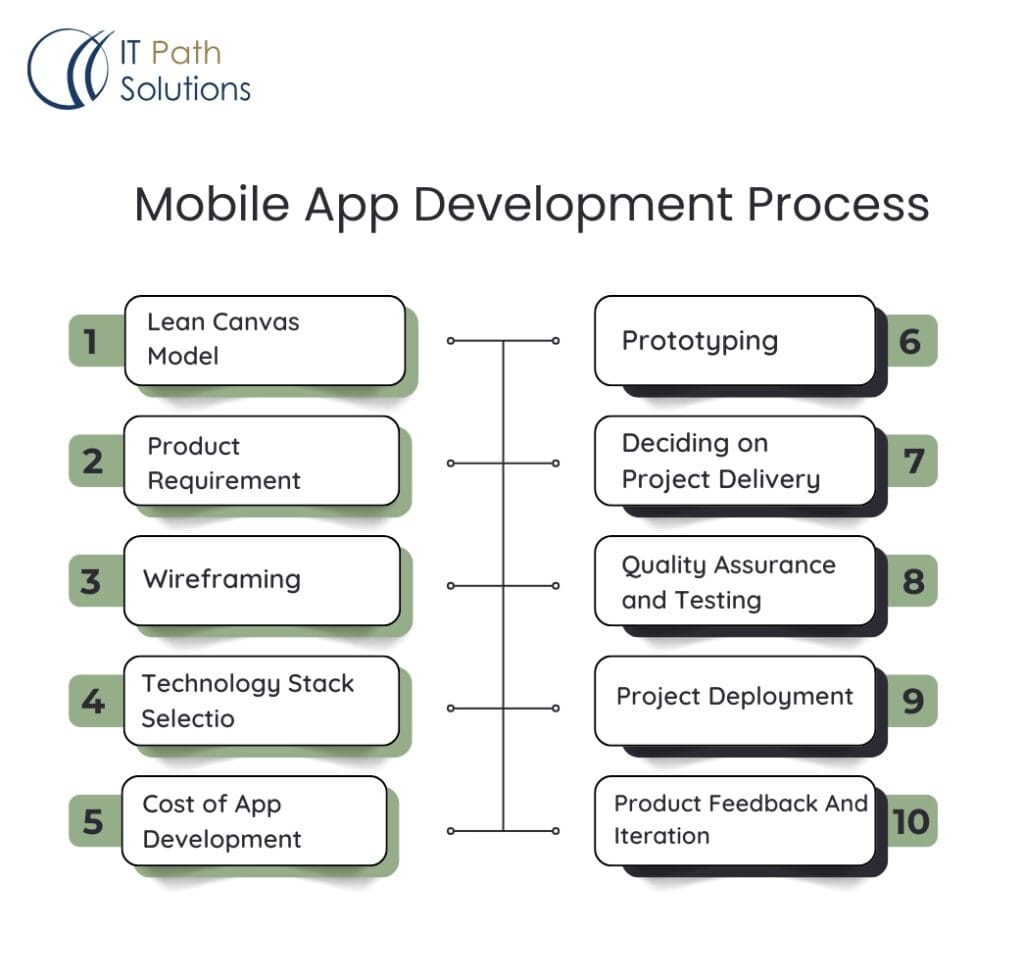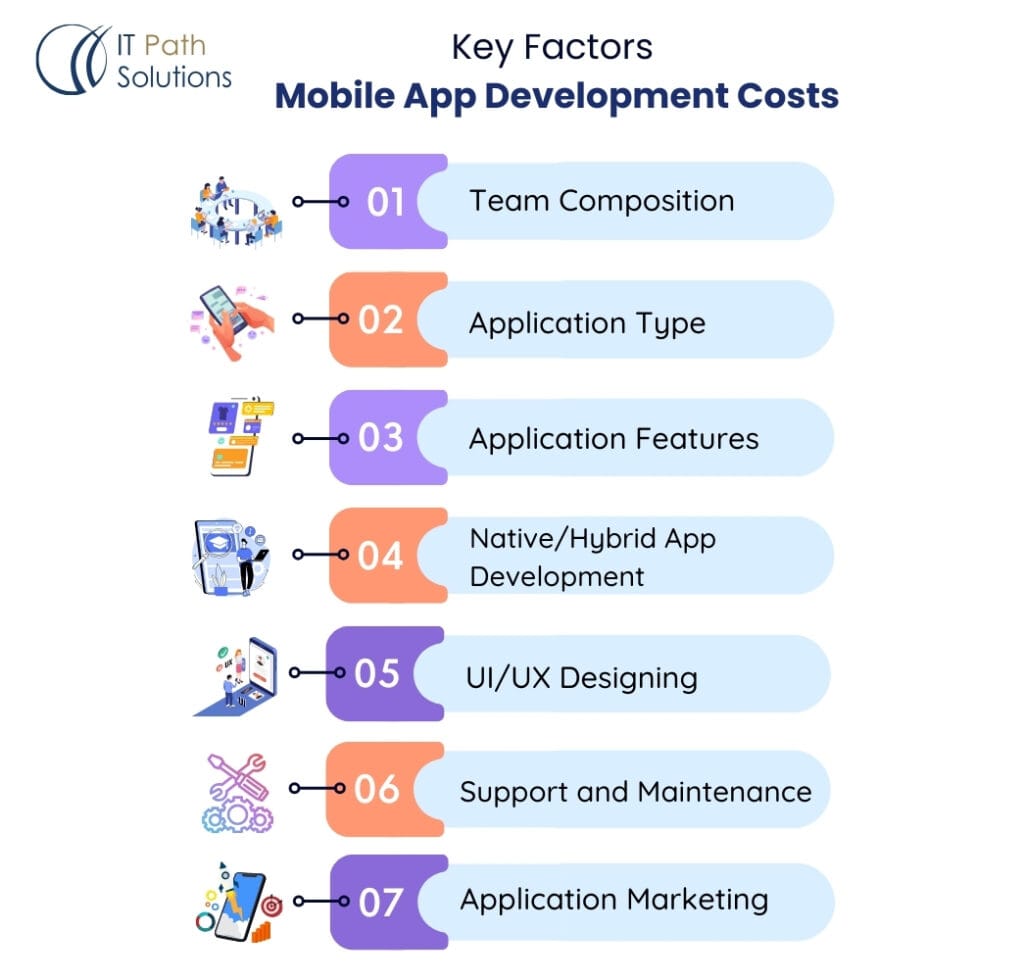Mobile App Development Process: IT Path Solution’s Way Of Developing an App
Keyur Patel
September 12, 2025
9 min
Everyone wants to deliver a risk-free product, but very few of them follow the structured mobile app development process to deliver one. At IT Path Solutions, we believe that our approach is unique and visionary, just like your app idea. When it comes to application development, there is no one-size-fits-all benchmark, each project demands a tailored strategy.
Our mobile app development process relies on clarity, innovation, and precision. It is an interesting journey that we embark on with our clients to bring their innovative ideas to life. We promise that with our well-planned app development process, you can be the next TikTok, Zoom, or something the world hasn’t seen in the rapidly bubbling new businesses in the market.
A brief about IT Path Solutions:
We are a pioneered mobile and web app development company with over 12 years of experience delivering versatile projects. Our team excels across multiple niches, catering seamlessly to a wide range of industry verticals. We meticulously examine every project’s details and curate a tailored development strategy accordingly. However, what sets us apart is our proven and efficient mobile application development process which ensures quality and timely project delivery. Ready to discover the secret sauce behind our success? Let us disclose our secret recipe for successful mobile application development.
The breakdown of our mobile application development process:

- Lean Canvas Model:
- Product Requirement Documentation;
- Wireframing;
- Technology stack selection;
- Cost of App development;
- Prototyping;
- Deciding on project delivery milestones;
- Quality Assurance and Testing;
- Project Deployment;
- Product feedback and iteration;
To begin with the first step in mobile app development:
Lean Canvas Model:
Lean Canvas Model refers to the process of evaluating and refining the business idea and implementing it. This lays the foundation for a successful execution and app development strategy. Lean Canvas model is the new version of Alex Osterwalder’s Business model canvas created by Ash Maurya.
Startup entrepreneurs, founders, and investors usually prefer Lean Canvas to collaboratively brainstorm the business idea. Further, the idea is narrowed down to a single-page overview that can be shared with stakeholders and clients.
Our first step to start the lean canvas model is to do market research about your product idea, identify answers to questions such as, what problem the product solves, who will be the target audience, etc, and find the Unique Value proposition for your product.
The nine blocks of the Lean Canvas model by Ash Maurya also discusses critical aspects such as revenue streams for the project and the expected cost of the app development process.
Product Requirement Documentation:
After putting all the efforts into market research and analysis, you kind of know what to expect from your product. Now put these thoughts on paper including specifications, functionality, features, and behavior of the product that you are going to develop. This is your Product Requirement Document.
We prepare a comprehensive document that helps you establish your product’s goal in terms of its release and effectiveness.
WireFraming:
Wireframe acts as a blueprint for your application. It gives a clear visual representation of how the user will interact and what functionality will be triggered upon interaction. Wireframe also outlines the page structure of the application, the information hierarchy and the user flow through the app.
You can use various online tools or simply draw the wireframe with a pen and paper, the choice is yours. Wireframing is cost-effective and our team at IT Path Solutions can help you create one and set the stage for a successful development process..
The wireframe is circulated to everyone in the team involved in the development process, including the project manager, clients, designers, and developers. You can use the wireframe to represent your application idea to the stakeholders and convince them of the investment.
Our wireframes will help you know the project flaws at an early stage so that you can have an action plan ready, well in advance.
Using our expertise, we develop different wireframes for mobile applications and web applications as the approach to both of them is different.
Technology Stack Selection for project:
A very important aspect of the mobile application development process is technology stack selection. One of our directors Mr. Keyur Patel specializes in guiding clients through critical decision-making processes and ensures that every project is built on a solid technical foundation.
Technology stack selection refers to the process of selecting technology for front-end, backend, development platform, and other elements such as performance & security. Choosing the right tech stack is vital for the app’s functionality, scalability, and overall success. We will break down the tech stack we have hands-on experience with.
We take pride in our expertise and will break down the various technologies we have hands-on experience with, ensuring you get the perfect combination of technologies tailored to your project’s needs.
| Front-end Development | HTML, CSS, JavaScript, JavaScript libraries JQuery, React.js, Zepto.js, Javascript frameworks Angular, Vue, Backbone, and Ember. |
| Back-end development | Ruby & Framework: Ruby on Rails:
Python & Framework: Django, Flask, and Pylons PHP & Framework: Laravel: Java & Framework: Spring: |
| Databases: | PostgreSQL, MySQL, MongoDB, and Oracle. |
| Servers | Nginx, Apache |
With the right selection, you will have a powerful application with a remarkable performance. Also, if you define the technology stack in advance, it will be easier for you to hire a developer accordingly.
For any queries, feel free to reach out to us!
Cost of App Development:
The cost of application development is a very crucial and extensive topic that requires a thorough discussion with your development partner. It varies significantly from company to company and multiple factors affect the final cost of application development. Several key factors that affect the final cost breakdown of mobile app development are:

- Team composition;
- Application type;
- Application features;
- Native/Hybrid app development;
- UI/UX designing;
- Support and Maintenance;
- Application marketing;
Our cost of hiring an app developer ranges between $20-$50 per hour and the app development costs are nearly $25000 to $45,000. However, this is subject to change considering the factors mentioned.
We request you to get in touch with us for any further cost-specific discussion.
Prototyping:
Prototyping is the heart and soul of the mobile app development process. It is a tangible visual representation of product development processes, showcasing all the planned features and functionalities of the application.
Prototyping a product takes it one step closer to the final product development. Once you have a prototype ready for your app idea, you can use it to showcase it to your stakeholders and convince them to invest in your product.
At IT Path Solutions, we use advanced tools like Figma and AdobeXD to create interactive prototypes. Prototyping helps us to identify potentially weak areas in the app so that we can make improvements accordingly.
Whether you develop low-fidelity or high-fidelity prototypes as per your requirement, our prototypes help clients communicate their product ideas, refine their vision, pitch them, and validate them over time before the full-scale development begins.
Decide On Project Delivery Milestone:
Our project manager is the primary contact for all your questions regarding application development. To ensure timely responses and quick progress, you must discuss your project’s expectations.
The first step to deciding on deliverables is to establish the project’s development methodologies.
Here are a few popular project development methodologies that you can choose from.
- Agile Project Management;
- Scrum Project Management
- Kanban Project Management;
- Waterfall Project Management;
- Lean Project Management;
- Six Sigma Project Management;
- PRINCE2 Project Management;
If you wish to know more about any of these methodologies, you can contact our team. They can discuss the details of each methodology with you.
Now based on the methodology you choose, here is the list of project management tools that will help you in the process.
- Basecamp;
- Trello;
- Asana;
- Zoho Projects;
- Jira;
Once you have concluded on this, it is time to discuss the project milestones. Our team fully cooperates with your project’s deliverables and promises to deliver accordingly.
Quality Assurance and Testing:
We all love a bug-free product, don’t we? However, what goes behind delivering a bug-free product is the hard work of the Quality Assurance teams. Our QA engineers are well-trained to test a product in various test environments, write descriptive use cases, and deliver them to you.
Our team performs regression testing to ensure the proper flow of functions. Here are a few responsibilities that our QA teams will religiously follow.
- User data input testing;
- Functionality testing;
- Messages and notifications testing;
- Performance issues testing;
- Device functionality testing;
- Security testing;
- Automated app testing;
- Visual elements testing;
- User acceptance testing;
And more…
Our dedicated team of Quality testers, proactively participate to make sure the release of applications that meets the quality standards.
Project Deployment:
After spending days and months developing your project, it is time to deploy it on your platform. Deployment refers to the process of transferring a product’s code and resources to a temporary location to check the functionality thoroughly.
IT Path Solutions, is an experienced and renowned application development company that helps you with Native deployment, Hybrid deployment, web deployment, Cloud computing platforms deployment, email server deployment, etc.
We use some of the popular hosting platforms such as:
- Amazon Web Services;
- Kubernetes;
- Vultr;
- Google Cloud Platform;
- Alibaba Cloud;
- Microsoft Azure;
- Digital Ocean;
If you have any questions regarding the selection of the deployment platform, our team will be happy to help.
Product feedback and iteration:
The post-deployment period is very crucial for any entrepreneur. This is the time when the product is released in the market, and your customers start engaging with it. But worry not. We understand the criticality of the situation and we know how to handle any downtime. We provide constant after-support to our clients and they will always have our backs.
If you have any critical comments and want to initiate any change, you can get in touch with us.
Our advice: Take it slow and one step at a time otherwise it might get overwhelming for you to handle the feedback.
Conclusion:
Mobile application is soon going to be a half-a-trillion-dollar industry and to be one of the active participants in the competition, you need a strong app development partner. IT Path Solutions is a veteran app development company, and our mobile app development process is the backbone of our successful delivery.
We have served various industries with the utmost client satisfaction. We deliver state-of-art solutions that can instantly impress your end-users. If you have found our mobile app development process comprehensive and want to initiate your application development, please get in touch with us.
Keyur Patel
Co-Founder
Keyur Patel is the director at IT Path Solutions, where he helps businesses develop scalable applications. With his extensive experience and visionary approach, he leads the team to create futuristic solutions. Keyur Patel has exceptional leadership skills and technical expertise in Node.js, .Net, React.js, AI/ML, and PHP frameworks. His dedication to driving digital transformation makes him an invaluable asset to the company.
Get in Touch
Search
Blog Categories